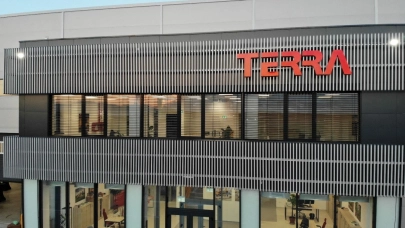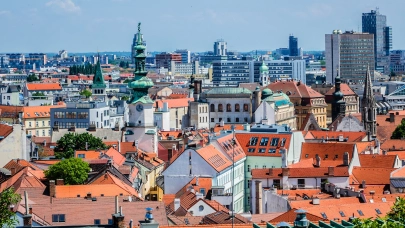According to the RICS Commercial Property Monitor for Q1 2015 most countries in Central and Eastern Europe can expect relatively strong economic growth and the expectations for commercial property markets are also broadly positive. The Occupier Sentiment Index has finally registered a positive value in all four examined countries. The Investment Sentiment Index is firmly in positive territory for both the Czech Republic and Hungary, but is also not in negative territory in Bulgaria and Romania.
According to the RICS Commercial Property Monitor for Q1 2015 most countries in Central and Eastern Europe can expect relatively strong economic growth and the expectations for commercial property markets are also broadly positive. The Occupier Sentiment Index has finally registered a positive value in all four examined countries. The Investment Sentiment Index is firmly in positive territory for both the Czech Republic and Hungary, but is also not in negative territory in Bulgaria and Romania.
Good growth prospects in most countries
The Bulgarian economy grew at an average annual rate of 1.7% in 2014. Going forward, the pick-up in consumption may be offset by tighter government spending which made a significant contribution to growth last year.
Following GDP growth of close to 3% in 2014, Romanian economic output is almost back at pre-crisis levels. With unemployment decreasing and with the sharp deceleration in inflation fuelling a rise in real incomes, consumption was the driver of expansion last year and is likely to stay so this year.
“European markets revealed an ever more complex and diverse picture in 2014 as a result of the substantial discrepancies between the economic factors, the geopolitical challenges and strategic interests across different regions and markets. The Romanian economy showed a positive sentiment in 2014 building on the strong growth recorded in 2013 as a result of a strong industrial production output and growing exports. The GDP growth forecast for 2015 is estimated at 2.5 - 2.8%. However, the EU anemic economic growth anticipated for 2015 remains a significant concern for the Romanian economy and its exporting sectors due to a potential weakening effect in the external demand," commented Radu Boitan FRICS, Senior Investment Director at Revetas Capital Advisors LLP in Romania.
In the Czech Republic stronger-than-expected exports and a recovery in domestic consumption indicate that the economy may continue to expand at a reasonable pace in 2015. The threat of a continuing fall in inflation is ensuring that the monetary policy stance will remain accommodative for some time to come.
With headline inflation turning negative in Hungary, it is likely that the central bank will be able to cut the benchmark interest rate which should boost domestic demand. At 3.7%, average annual GDP growth in Hungary was amongst the quickest of all 28 EU nations during 2014 and the prospect of another solid year of economic growth is reflected in commercial property sentiment.
“Real estate and macroeconomic fundamentals point to an improvement in property markets across the CEE region. Occupier demand, development activity and bank financing are on the upswing. It remains to be seen if the positive sentiment of our members will be sustained and whether the above mentioned positive trends will be matched by a sustained improvement in the investment markets," added Noah M. Steinberg FRICS, Chairman & CEO of WING.
Romania has the strongest occupier market
The Occupier Sentiment Index is now positive across each country, with market conditions reportedly improving at the quickest pace in Romania, followed by Hungary (although Bulgaria has a similar reading) and at a more modest rate in the Czech Republic.
“The positive sentiment in the office occupier markets is underpinned by increased activity of the IT sector across all CEE countries. Nevertheless, despite this activity, markets such as the office market in the Czech Republic will remain heavily tenant oriented due to the massive ongoing development pipeline. However, in the longer term, assuming the economic upturn will not be halted, the office demand is expected to catch up with the new office development," said Marcel Kolesár MRICS, Director, Head of Valuation and Advisory Services at Colliers International in the Czech Republic.
Occupier demand increased in all sectors in Bulgaria, the Czech Republic and Romania. The increase in demand was especially strong for office space in the former two, while in Romania the retail sector posted the strongest rise. In Hungary occupier demand varied substantially between sectors. Demand actually fell for retail space for the second consecutive quarter, which in part may be due to the recently introduced ban on Sunday shopping.
When comparing twelve month rent expectations across each nation, the strongest rental growth is projected to come in Romania, with each sector (both prime and secondary) anticipated to post solid gains. Meanwhile, rents are expected to rise modestly in Bulgaria (led by the prime office sector). In Hungary, rents are projected to remain broadly stable at the headline level although prime areas of the market may see growth while secondary markets may record declines. Czech Republic rents are expected to fall marginally at the headline level, although the negative trend is largely concentrated in secondary markets.
Bulgaria’s investment market underperforms
The Investment Sentiment Index showed a further improvement in investor mood and is firmly in positive territory for both the Czech Republic and Hungary. Meanwhile, investor sentiment is marginally positive in Romania, and broadly neutral in Bulgaria.
“Investment markets across the CEE region witnessed and upturn in 20014 and this trend is expected to continue during for the 2015 with sustained demand for the large ticket transactions from institutional buyers. In 2015 Poland and the Czech Republic will remain the key performers in terms of the real estate investment activity, with the remaining CEE countries to following the suit," added Marcel Kolesár MRICS.
Investment enquiries, both from domestic and foreign buyers, continued to rise at a healthy rate across the board in the Czech Republic, Hungary and Romania. In Bulgaria, however, investment enquiries only rose in the office sector and at a more modest rate in the retail sector, while investor demand in the industrial sector fell slightly.
“The investor interest in the office sector is easily explained by rising occupier demand for quality space and stable rents, especially in the prime segment. Meanwhile, on the retail market most purchases involve unfinished or underperforming shopping centers in the big cities with the clear intention for repositioning of the projects," said Michaela Lashova, MRICS, Managing Partner at Forton, Cushman & Wakefield Alliance Member in Bulgaria and Macedonia.
Nevertheless, capital values are projected to increase, to a greater or lesser extent, across all four countries over the next twelve months. The strongest capital value growth is expected in Romania and Hungary with both prime and secondary property seeing prices rise. In the Czech Republic, prime areas of the market should see solid price growth (led by prime retail) while secondary market values are expected to remain flat. In Bulgaria, prime offices should see the most significant capital value growth, while secondary units (particularly industrial) are set to remain weak.



